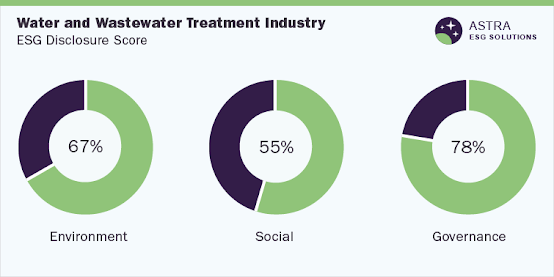Integrating ESG into decision making and business strategies contributes to an effective due diligence and a better investment decision for the company as well as relevant stakeholders. The companies that fall under the 5G services industry have been transitioning and addressing their sustainability progress and agenda.
This segment has more social impact compared to environmental impact. Accessibility has been the primary focus of this market is to provide high quality services, solutions and optimal attention to people, profit and planet. These companies also disclose their own data privacy and protection policies which ensures security for customer’s personal information. This safety is also accompanied by technological advancements like big data, Internet of Things (IoT) and Artificial Intelligence. Stakeholders are also concerned about the negative health impact of 5G services due to its carcinogenic nature.
During the COVID-19 pandemic, this market had been significantly impacted with increased use of the internet by professionals and students alike. The United Nations’ Sustainable Development Goals (UN SDGs) is a comprehensive framework that helps companies in this market obtain a perspective on the impact of their products and operations on ESG parameters.
Discover more regarding the practices and strategies being implemented by industry participants in the 5G Services Industry ESG Thematic Report, 2023, published by Astra ESG Solutions
In this blog, we delve into the importance of ESG in the 5G services industry and how it can drive positive change.
Environmental Sustainability:
The 5G services industry has the opportunity to lead the way in environmental sustainability. By prioritizing energy-efficient infrastructure, optimizing network operations, and leveraging renewable energy sources, companies can reduce their carbon footprint and minimize environmental impact. Sustainable practices can pave the way for a greener digital future.
Social Inclusion:
Ensuring digital inclusion is a critical aspect of the 5G services industry's ESG journey. Companies must work towards bridging the digital divide by providing affordable and accessible 5G services to underserved communities. Promoting digital literacy programs and addressing connectivity challenges can empower individuals and promote social equity in the digital era.
Governance and Ethics:
Strong governance and ethical practices are fundamental for building trust and ensuring responsible growth in the 5G services industry. Companies should prioritize data privacy, security, and transparent data governance. Compliance with regulatory frameworks and industry standards, along with responsible supply chain practices, can foster a culture of integrity and accountability.
ESG Trends
- Accessibility to all through 5G services is a vital trend in ESG, with companies focusing on reducing inequalities and providing faster internet access to consumers.
- Companies in this segment are innovating through big data, AI, and IoT, and adopting circular economy practices to reduce energy consumption and waste production. However, the 5g services industry is reported to have a negative health impact on health and wellbeing, with limited carcinogenicity compared to higher frequencies like FR1.
ESG Challenges
- Cyber security and data privacy are major challenges for the segment in terms of personal data and financial transfers.
- Lack of infrastructure and bandwidth is a major reason why some countries did not proceed with 5G services, and price transparency is a concern for only tech-savvy patients.
- 5G deployment requires meeting National investigation agency criteria and obtaining licenses from UASL, CMTS, or UL, as well as addressing negative impacts on health, animals, and biodiversity.
Is your business one of the participants in the 5G Services Industry? Contact us for focused consultation around ESG Investing, and help you build sustainable business practices
Growth of the 5G Services Market
The 5G Services market has been flourishing along with new innovative spaces like big data, AI, IoT etc. Incorporating technologies to mitigate negative health impact for People and the planet should be critical areas of interest for this segment in order to sustain in this market. Joint effort from industries and telecommunication authorities of countries across the world who don't have access to such technologies must also be propelled to retain market value. This market has been valued at 48.25 billion USD in 2021 and is expected to propel to a massive 56.7% compound annual growth rate.
Key Companies in this theme
• T&T, Inc.
• BT Group plc
• China Mobile Ltd.
• China Telecom Corporation Ltd.
• Bharti Airtel Ltd.
• NTT Docomo
• KT Corp.
• Saudi Telecom Company
• Vodafone Group
• Deutsche Telekom AG
• SK Telecom Co., Ltd.
• Verizon Communications, Inc.
• T-Mobile USA Inc.
• Rakuten Mobile Inc.
The 5G services industry has the potential to shape a sustainable, inclusive, and responsible digital future. By prioritizing environmental sustainability, social inclusion, ethical governance, responsible innovation, and transparency, the industry can unlock its transformative power while safeguarding the planet and benefiting society. Let's work together to ensure that 5G services drive positive change for all.
Browse more ESG Thematic Reports from the Technology Sector, published by Astra - ESG Solutions
About Astra – ESG Solutions by Grand View Research
Astra is the Environmental, Social, and Governance (ESG) arm of Grand View Research Inc. - a global market research publishing & management consulting firm.
Astra offers comprehensive ESG thematic assessment & scores across diverse impact & socially responsible investment topics, including both public and private companies along with intuitive dashboards. Our ESG solutions are powered by robust fundamental & alternative information. Astra specializes in consulting services that equip corporates and the investment community with the in-depth ESG research and actionable insight they need to support their bottom lines and their values. We have supported our clients across diverse ESG consulting projects & advisory services, including climate strategies & assessment, ESG benchmarking, stakeholder engagement programs, active ownership, developing ESG investment strategies, ESG data services, build corporate sustainability reports. Astra team includes a pool of industry experts and ESG enthusiasts who possess extensive end-end ESG research and consulting experience at a global level.
For more ESG Thematic reports, please visit Astra ESG Solutions, powered by Grand View Research


